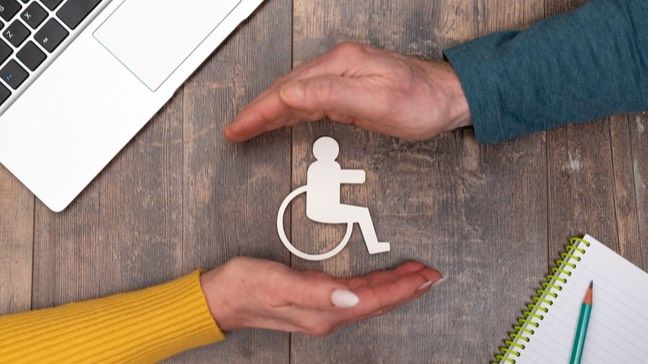
Disability Insurance Guide: Everything You Need to Know
Life can be complicated. Purchasing insurance is paramount if you want to be able to protect different things in your life, like health insurance in case you get injured. Protecting your ability to earn money? That’s important, too.
To insure against a situation where you can’t receive a paycheck, you’ll need disability insurance. Our disability insurance guide will go over what you need to know, including what it covers, the different types, and how to purchase a policy.
- What Does Disability Insurance Cover?
- How Does Disability Insurance Work?
- What is Long Term Disability Insurance?
- What is Short Term Disability Insurance?
- How Much is Disability Insurance?
- Is Disability Insurance Taxable?
- How Much Disability Insurance Do I Need?
- What Insurance Do You Get With Social Security Disability?
- How to Get Disability Insurance
- Disability Insurance Companies
- Is Disability Insurance Worth It?
What Does Disability Insurance Cover?
Before we talk about what it covers, let’s go over what disability insurance is. Also referred to as DI, it’s a type of protection that’ll pay you some of your regular monthly income if you aren’t able to work due to an injury or illness.
If you’ve fallen ill or are injured under one of the covered ailments and can’t perform your regular job duties, the insurance policy should kick in. The amount you’ll get and for how long depends on your policy — you can get this either through your employer or on your own.
In addition to a private disability insurance policy, there’s also Social Security Disability Insurance (SSDI) which is provided for free from the federal government. This only kicks in if you have what’s considered a severe disability and meet the qualifying requirements.
How Does Disability Insurance Work?
The point of disability insurance is to get a portion of your gross monthly income to pay for life necessities such as housing and food. All you need to do is to pay a monthly premium once you have a disability insurance policy to keep it intact.
A policy will have an elimination or waiting period, which is the amount of time you’ll need to wait before you’re able to apply for benefits. In most cases, the waiting period for a short term disability policy is one to two weeks, and long term policies can be as long as 90 days.
The amount of benefit you’ll receive will vary but it’s generally around 60% of your gross monthly income. You’ll receive a benefit for a specified amount of time, also called a benefit period. The benefit may stop even if you’re still ill or injured but you’re able to perform regular duties at your job.
What is Long Term Disability Insurance?
Long term insurance is a type of insurance policy that protects your income for a longer period of time if you can’t work because of an accident, injury or illness. You or your employer can purchase policies that provide benefits for two years, five years, 10 years or all the way until you retire. This type of insurance doesn’t cover work-related accidents that are typically covered under a workers’ compensation insurance plan.
What is Short Term Disability Insurance?
Short term disability insurance has a shorter waiting period but provides benefits for a shorter amount of time — usually three to six months or up to one year. It can provide up to 80% of your income that’s lost due to an illness or injury.
Some employers may provide short term disability group plans instead of having a maternity leave policy in place.
How Much is Disability Insurance?
Unfortunately, there isn’t a predetermined amount you’ll pay for disability insurance policies that’s standard across the board. This is because monthly premiums will depend on your risk of becoming disabled. As in, the higher your risk, the more you could pay.
Here are the factors that disability insurance companies may weigh:
- Age: The older you are, the more likely you may become disabled.
- Gender: Women tend to file more claims, hence an increase in risk.
- Health history: Insurers look into things like your tobacco usage, weight, height, and chronic conditions.
- Occupation: The riskier or more difficult your job is, the more likely your premiums will be higher.
- Income: The higher your income, the higher benefits you’ll need to collect. It means you’re a bigger financial risk to the insurer, resulting in higher premiums.
- Location: Your area or state could pose different risks to the insurer.
- Waiting period: The longer your waiting period, the less you could pay for your premium.
Is Disability Insurance Taxable?
Private disability insurance benefits are generally exempt from taxable income. Employer-sponsored plans may be taxable.
How Much Disability Insurance Do I Need?
How much you’ll need depends on your income and how much you think you can live off your savings if and when you do get injured or become ill. It’s safe to assume that the higher your income, the higher your monthly benefit payout needs to be. Take a look at your expenses and estimate how much it’ll cost you each month to have a similar standard of living.
As for savings, the more you have, the less benefits you could need. That’s why it’s important to look at your financial situation now and use that as the basis of calculating the amount of benefits you’ll need.
What Insurance Do You Get With Social Security Disability?
SSDI is administered by the Social Security Administration and pays benefits if a qualifying disability prevents your ability to work. However, SSDI benefits are notoriously difficult to qualify for compared to private or employer-sponsored plans. Qualifications include the inability to work for at least a year due to a disability, you’re severely limited in your ability to conduct basic activities and worked at a job covered by Social Security.
According to the Social Security Administration, the average monthly benefit was $1,234 in 2019.
How to Get Disability Insurance
You can get disability insurance through your employer — some may provide these benefits for free but you can buy it as part of their voluntary benefits. Other options include buying it through a professional association or privately through an insurance company.
Disability Insurance Companies
Luckily, there are many companies that offer disability insurance policies. Here are some worth looking into:
- Breeze: Applicants can receive a quote and get a policy within minutes (read our full Breeze disability insurance review for more information).
- Policygenius: You can compare multiple quotes all in one place, saving you time and hassle (read our full Policygenius insurance review for more information).
- Quotacy: Like PolicyGenius, you can receive multiple quotes (read our full Quotacy insurance review for more information).
- Health IQ: This company offers up to a 15% discount if you’re considered healthy.
- MassMutual: As one of the largest insurers, you may be able to buy a policy through your employer voluntary benefits or privately.
- Standard: All residents except for those in Wyoming can purchase a disability insurance policy, which The Standard calls their Platinum Advantage plan.
- Guardian Life: This New York based insurer offers individual and employer sponsored policies.
- Assurity: Founded in 1890, this insurer provides policies for millions of their members.
Is Disability Insurance Worth It?
To figure out whether it’s worth it, you want to look at what you’ll need to do if you can’t work for a prolonged period of time. Do you have enough savings that can last you a few months? A few years? What about others in your family — can they make up for the lost income or are you the breadwinner?
Even if your employer provides coverage, it’s a good idea to take a look at exactly what you get — if it’s not enough, you may want to consider purchasing your own policy.
Ultimately, purchasing disability insurance is worth it if you want to protect your income and will find it difficult to keep up with your expenses without it. It’s better to take proactive steps to do so rather than wait when it’s too little too late.


Article comments